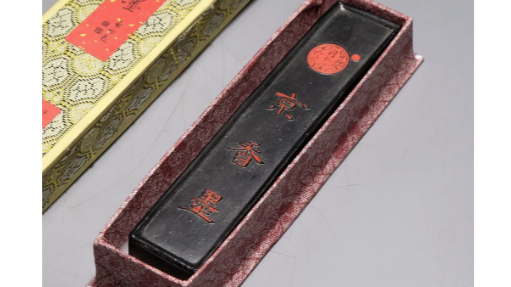
20231103
The Four Treasures of the Study in Ancient and Modern Times: Ink

Ink, one of the Four Treasures of the Study, has been passed down to this day and has a history of thousands of years. When we think of ink, we often only think of brushes and fountain pens. With the rapid development of scientific and technological innovation, ink is still active in many fields of our lives in different forms and plays many roles. Today, we will talk about the growth and evolution of ink in this thousand-year history.
Natural Ink
Ancient ink was made from natural animals, plants and minerals as its main raw materials. From the existing unearthed artifacts, the original black pigment was mainly derived from burned organic carbon, animal and plant secretions, colored soil and colored ores, etc. According to legend, Xing Yi, who was good at painting, accidentally discovered that the pot ash under the stove was finely powdered and black in color, and seemed to be suitable for painting, so he added some water to the pot ash. This was how China's earliest ink was born.
Artificial Ink-making
Later, the rise of artificial ink making became a very important skill in our country and had a great influence on later generations. The production process of ink is many and complicated. The main steps include refining tobacco, mixing materials, production, drying and gold tracing. Each process requires different materials and methods, and is absolutely meticulous.
Refining Tobacco
Use incomplete combustion to extract smoke from pine branches, grease and other materials.
Mixing Materials
Boil the glue (hide glue or bone glue) over a slow fire, add soot, musk, borneol and other materials, stir thoroughly, and pound with a pestle. It is said that it takes up to 100,000 hammers and pestles repeatedly to achieve a fine and uniform level to make a blank.
Production
Knead the blank into an ink ball according to the specifications, and then press it into the mold to finalize the shape.
Drying
After the ink is formed, it needs to be dried. There are three methods: laying it flat, putting it in dust, and hanging it. In addition, the temperature must be moderate, otherwise it will affect the quality of the ink.
Gold Tracing
After drying, trace the gold pattern on the ink surface.
Later, on the basis of inheriting traditional craftsmanship, dye ink and pigment ink were created. It is worth mentioning that ink is still commonly used in traditional Chinese medicine, that is Wujin.
Ink Jet
With the advancement of the times and the development of science and technology, the demand for electronic products has increased significantly. Various printers and ink screens have come out one after another, and inkjet ink and electronic ink have appeared in people's lives. The combination of technological innovation and traditional craftsmanship creates endless possibilities. Chen Juntian, the only remaining descendant of traditional artificial ink making, used 3D printing, a type of rapid prototyping technology, to make ink chess pieces. It also combined with virtual reality to allow young people to have a glimpse of the entire process of artificial ink making.
These have also attracted more people's interest in traditional culture. I hope that everyone can have a better understanding of ink and traditional culture through the article, so that Chinese culture can be better spread.






Previous Article
Hantec Group Participated in Food Sharing Project Volunteer Activity
Next Article
Extended Reading
亨達集團主席接受文匯報訪問表示劵商盼分享大灣區商機
BY Group Branding and Promotion FROM Hantec Group
<還看金市>黃金成了比特幣的犧牲品?
BY Group Branding and Promotion FROM Hantec Group
<Gold Market Review>Swap Between Long and Short, Gold is At Stake?
BY Group Branding and Promotion FROM Hantec Group
Unit 4614, 46/F, COSCO Tower, 183 Queen’s Road Central, Hong Kong
(852) 2214 4288
Unit 4614, 46/F, COSCO Tower, 183 Queen’s Road Central, Hong Kong
(852) 2545 5065 / (852) 2214 4188